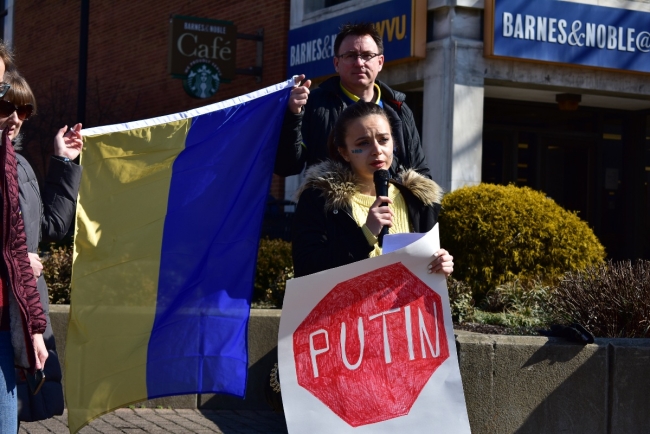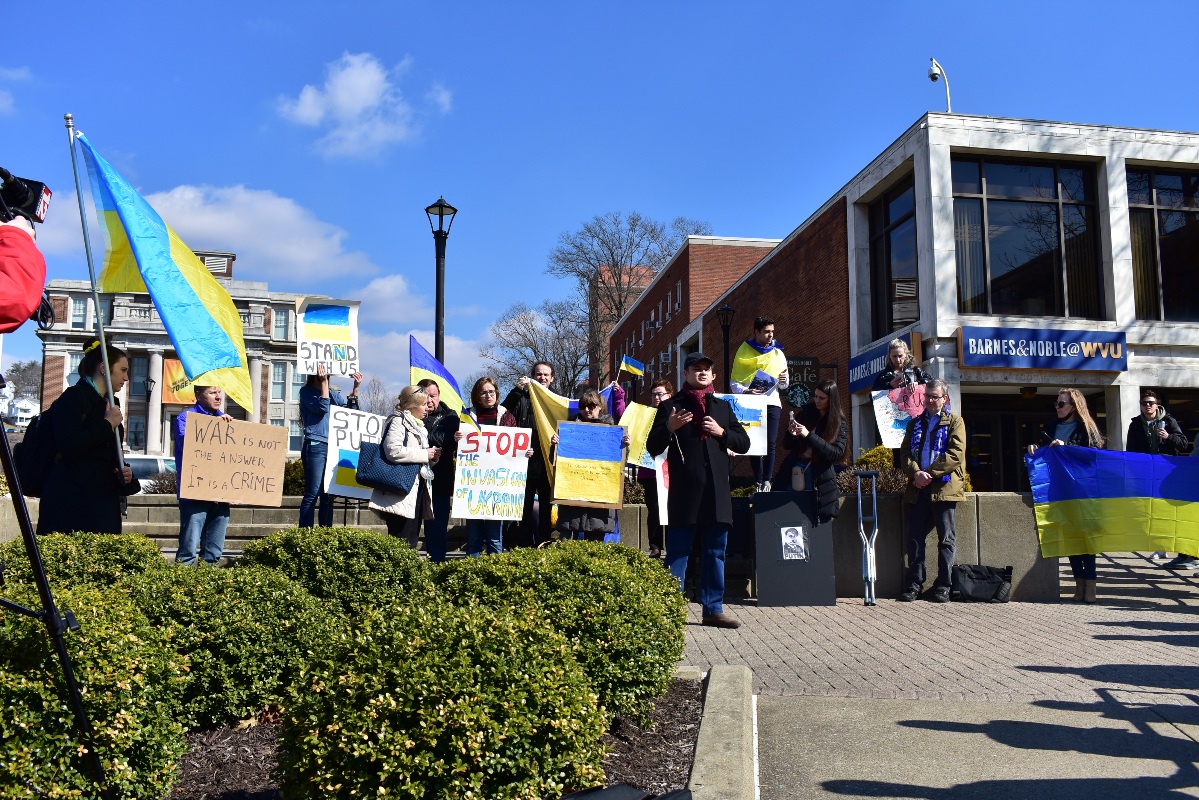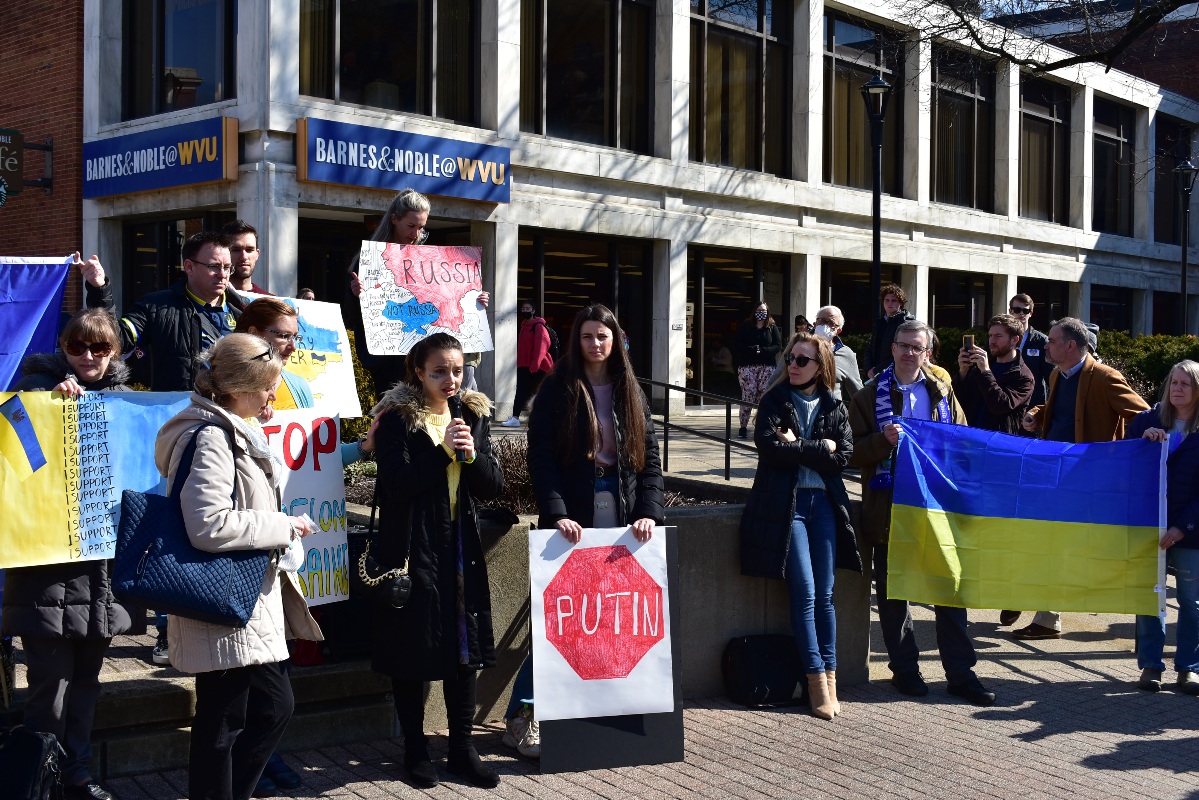You have /5 articles left.
Sign up for a free account or log in.

Ukraine native and West Virginia University graduate student Khrystyna Pelchar protests against war in Ukraine.
Jake Hough
Ukraine native Khrystyna Pelchar, a graduate student at West Virginia University, watched with mounting dread as Russia launched an attack on her home country Wednesday night. She feared for her sister, who lives in eastern Ukraine.
“I was in shock,” Pelchar said. “I did not leave the house. I was just crying. I was checking an interactive map in Ukraine, and I was checking if my sister’s still alive, because there was an explosion next to the city she was in.”
To raise awareness of what was happening in her homeland, Pelchar decided to organize a rally Monday at WVU’s Mountainlair building, a student union. She and the other organizers handed out more than 100 fliers informing bystanders about the invasion of Ukraine and provided a QR code that people could scan to find organizations accepting donations to help Ukrainian civilians.
Over the course of five hours, more than 300 people came to either observe or support the cause.
“It was so inspiring to see how people really care,” said Pelchar, who during the rally wore a yellow sweater and the words “peace” and “#NATO” inked in blue on her face. “I looked into their eyes. And I saw the real support. There’s no ignorance on the streets of Morgantown. And I’m happy to be in such a place where people are attentive and they understand that what’s happening in Ukraine is not just Ukraine’s problem.”

Joining Pelchar in protest was Chris Shockey, a graduate student, who said he began following tensions in Ukraine after befriending Pelchar last semester. When Russia attacked last week, he knew he needed to inform more people about what was going on.
“When the attacks happened, my immediate response was ‘I can’t believe this is actually happening,’” Shockey said. “I’ve been keeping up with Khrystyna and trying to get more and more people to pay attention. Even people that I have known for years in Morgantown, I’ve been telling them all about what’s happening in Ukraine and trying to get people to be knowledgeable about it.”
Putin the Pariah
Since Russian president Vladimir Putin ordered his troops to invade Ukraine, more than 190 people have died due to missile strikes and attacks from Russian convoys, The Washington Post reported.
But Ukrainians have fought back with surprising force, bolstered by international support. Colleges and universities have become a key bulwark in that fight. The leaders of a number of scholarly associations and research centers have spoken out against Russia’s attack on Ukraine, and the Massachusetts Institute of Technology announced Friday that it was ending its program in Russia with the Skolkovo Institute of Science and Technology.
“This step is a rejection of the actions of the Russian government in Ukraine,” MIT said in a statement regarding the severing of ties. “We take it with deep regret because of our great respect for the Russian people and our profound appreciation for the contributions of the many extraordinary Russian colleagues we have worked with.”
At colleges and universities across the U.S., students, too, have joined in the antiwar effort, participating in rallies on and off campus. They wave blue-and-yellow flags and march with signs bearing messages such as “No war, save Ukraine” and “Stand with Ukraine.” Students have also taken up collections for organizations such as the Armed Forces of Ukraine and the Revived Soldiers Ukraine fund.
At MIT, the student group Ukrainians of MIT organized a rally Monday in front of the institution’s Stata student center.
MIT professor Nick Montfort posted a photo on Twitter of dozens of students marching with signs and wearing blue and yellow. They were chanting, “Stop war in Ukraine,” he wrote.
Some Ukrainian students at MIT also spoke to the local press about the impact of Russia’s invasion on their families back home. Mathematics and mechanical engineering student Sasha Horokh told Boston public radio station WGBH that friends and family in Ukraine were trying to stay calm and do “whatever they can to protect Ukraine.”
“They definitely are scared for their futures, for their loved ones’ futures, for the future of their country and their home,” Horokh told WGBH. “However, being scared isn’t going to help much.”
Before the University of Illinois at Urbana-Champaign Ukrainian Student Association’s protest Sunday, it issued an Instagram post urging students to make signs focused on “peace, support and awareness.” It listed a few sample phrases—such as “Peace for Ukraine” and “No War in Ukraine”—discouraging hateful signs, speech and clothing.
After the protest, the Ukrainian Student Association posted photos showing dozens of students and community members holding signs and flags and wearing blue and yellow. One sign read “Leave Ukraine alone,” and another read “UIUC stands with Ukraine.”
“We are so amazed and incredibly grateful for the support of our UIUC community today,” the group wrote on Instagram. “Thank you so much to everyone who came to our rally to stand with Ukraine. It means so much to every single one of us in the Ukrainian Student Association.”
Penn State University’s Ukrainian Society held a protest last Thursday and is hosting another this Thursday at Old Main Plaza, a landmark campus administrative building. On Monday night, the organization hosted a poster-making session, for which it provided supplies.
“Thank you to everyone who came to show their support today,” the group wrote on Instagram after its first rally. “Remember to stay informed, donate to Ukrainian organizations supporting citizens/soldiers/families in Ukraine.”
Some students held signs that read “СЛАВА УКРАЇНІ!” a national salute meaning “Glory to Ukraine.” The Ukrainian Society also posted on Instagram a QR code to raise funds for the Armed Forces of Ukraine and Revived Soldiers Ukraine.
Other campuses where students are planning or have already staged protests include Harvard University, the University of Michigan, Princeton University, Bucks County Community College, Stanford University and the University of Washington.

Additionally, the American Council on Education and 12 other higher education organizations signed a letter to Secretary of State Antony Blinken and Secretary of Homeland Security Alejandro Mayorkas, calling for their agencies to “provide as much flexibility and support as possible for Ukrainian students and scholars currently in the United States, and for students and scholars seeking to leave Ukraine during the current crisis.”
The organizations asked for the more than 1,700 Ukrainian students in the U.S. to be granted leniency regarding their current visas, since some could be close to the end of their program of study, research or training but might not be able to immediately return to Ukraine during a war.
The organizations also wrote that some Ukrainian students and scholars may face changes to their financial situation and asked the two secretaries to accommodate those who must work while studying in the U.S.
“President Biden has designated the DHS as the lead federal agency to coordinate Ukraine-related domestic preparedness and response,” the organizations wrote in the letter. “Our colleges and universities and the U.S. higher education community at large stand ready to be a resource for displaced international students and scholars, just as we always have during the pandemic and previous political upheavals and military conflicts across the globe.”
Pelchar hopes the fighting will be over soon, but she said she and the WVU campus community will be ready to rally if the war in Ukraine continues.
“I really hope that I don’t have to protest again,” Pelchar said. “I really pray that I will not have to … I want peace in Ukraine. And hopefully, the war ends tomorrow, and there will be no demonstration. But if it continues, yes, we have people who are able to mobilize very quickly.”




